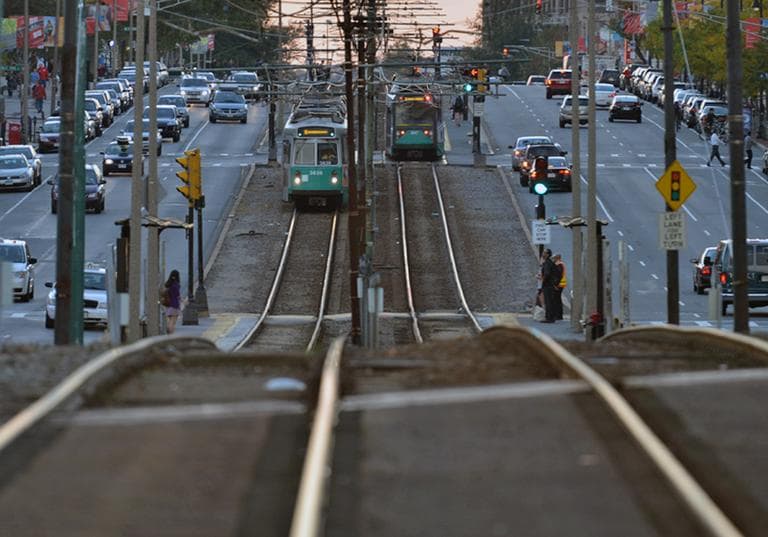Advertisement
MBTA GM Responds To Your Comments
Resume
MBTA General Manager Beverly Scott joined Radio Boston on Monday to talk about her plans for the public transport network.
Listener comments and questions poured in, and Dr. Scott promised to respond.
Here are some of her answers:
Baylorbennett from radioboston.wbur.org
"What will B Scott do to keep the partnership of the MBTA and bicycles strong? Bikes should be a partner of T an not an accessory. I applaud the current bike racks, paths, and HUBWAY efforts but I think more can be done to make bikes ON the T during rush hours a reality. Will this ever happen?"
We are thrilled that you appreciate the recent investments in bike racks aboard buses, expanded bike parking facilities at subway stations, multi-use paths, and the Hubway bike share program.
We have made it easier to bring a bike on the T during rush hour on the Blue Line by allowing an extra hour each way in the AM and PM, meaning the restrictive rush hour period is lessened by an hour outbound in the morning and inbound in the evening. Unfortunately, due to the increased ridership during the peak periods, we currently do not have the room to allow for bikes to safely fit on our trains and not restrict passenger flow. Folding bikes are allowed on all MBTA vehicles at all times when completely folded. Over 95% of the MBTA’s bus fleet is now equipped with bike racks-each capable of holding two bicycles.
Inefficient Ride from radioboston.wbur.org
"How financially better is the MBTA now that trolley riders (on the B, C, D and E green lines) can't sneak in and, therefore, must pay the trolley fare?" (Given that it takes more time to load people through one or two doors.)
The MBTA believes the front-door only boarding has created a culture whereby customers are consistently paying their fare and less likely to attempt to board without paying and this is reflected in the increase in fare revenue over the past year. Fare revenue on the Green Line rose from $38.3 million in July-December 2011 to $45.6 Million during the same time period in 2012. Overall, fare revenue is up 21.6% across the system over the first six months of last year and we believe this is a result of better and more efficient fare collection. We are sensitive to the additional boarding time but feel we owe it to our customers to attempt to collect every fare possible.
J__o__h__n from radioboston.wbur.org
"Why not save money by closing half the green line stops? If you can see the next stop, they are too close."
The MBTA regularly examines service improvements, including stop consolidation where we believe it would improve operations for an entire route. Stop consolidation of lightly used and very closely-spaced portions of the Green Line could be a way to reduce our customers’ total travel time. Eliminating half of the Green Line stops is probably excessive, but there are probably 4-8 stops that we could consider consolidating that would have a net positive benefit to our customers. There are no immediate plans in the works, but this is something that we can look into.
jefe68 from radioboston.wbur.org
“Why does it cost $173 a month to go 4 stops from Hyde Park to South Station? The zoning of the Commuter rail needs to be overhauled help the people in this area and Roslindale. People live father out in Newton and pay less for T service than the residents in Hyde Park. The only service we have out in Hyde Park are buses, some of which are a nightmare (32), and the Commuter rail which is way over priced for due to the wacky zoning. All of Boston should be in the same zone!”
The MBTA is engaged with stakeholders in the Hyde Park and Roslindale areas as well as all along the Fairmount Line. Re-evaluating fare policy on this line is under review by the MBTA. Our goal with any changes would be to increase ridership and ensure equity for passengers system wide. The opening of three new stations on the Fairmount Line presents a great opportunity to consider alternatives to today’s structure.
Saul Blumenthal from Facebook
"I'd like to ask GM Scott why, when signal problems and broken-down trains are seemingly the norm of every rush hour, are the T and T police spending even one dime on bag checkpoints that search fewer than 0.02% of daily T riders at just one of the thousands of entry points onto the T? And why, if these checkpoints are vital to keeping the T safe from terrorism (which I expect is the answer she'll give if you ask her this), there were no checkpoints set up in the mid-'90s, when both the Paris and Tokyo subways were attacked, and when a NY subway car and a LIRR train were attacked as well"
These random, non-intrusive inspections are funded by the Department of Homeland Security. The MBTA does not have the option of using DHS funds for subway maintenance.
Although there has not been an actual attack in this country , mass transit still remains a possible target for terrorists. The FBI has made arrests in several plots that involved possible attacks in this country; one of those involved the Washington DC metro system.
Inspections are a recommended practice of the Department of Homeland Security and Transportation Security Administration (TSA) to prevent, deter or disrupt a possible terrorist attack.
Through a cooperative agreement, the MBTA Transit Police utilize TSA personnel to assist us with the inspections.
Courts have upheld the use of inspections in Boston and New York City.
Inspections take less than 1 minute, usually 20-30 seconds. Similar types of inspections are being used in Los Angeles, Washington, DC, Atlanta, New York City and at Amtrak.
Got more questions? Email the MBTA chief directly: bscott@mbta.com
This segment aired on February 27, 2013.